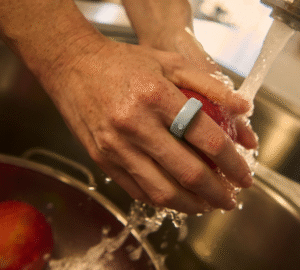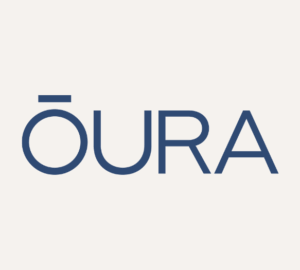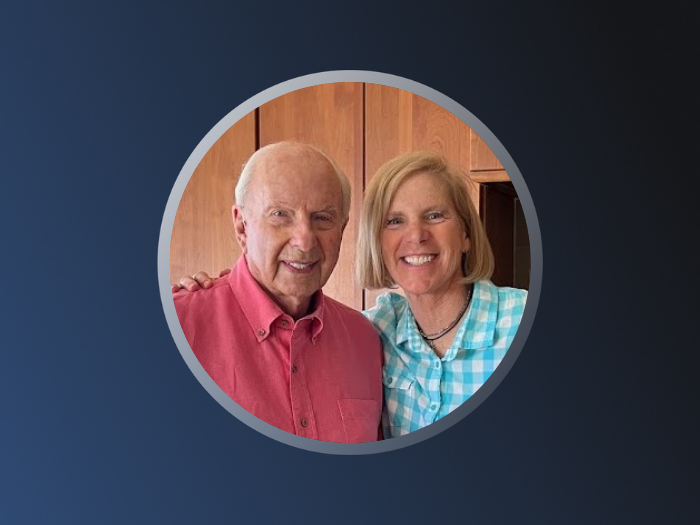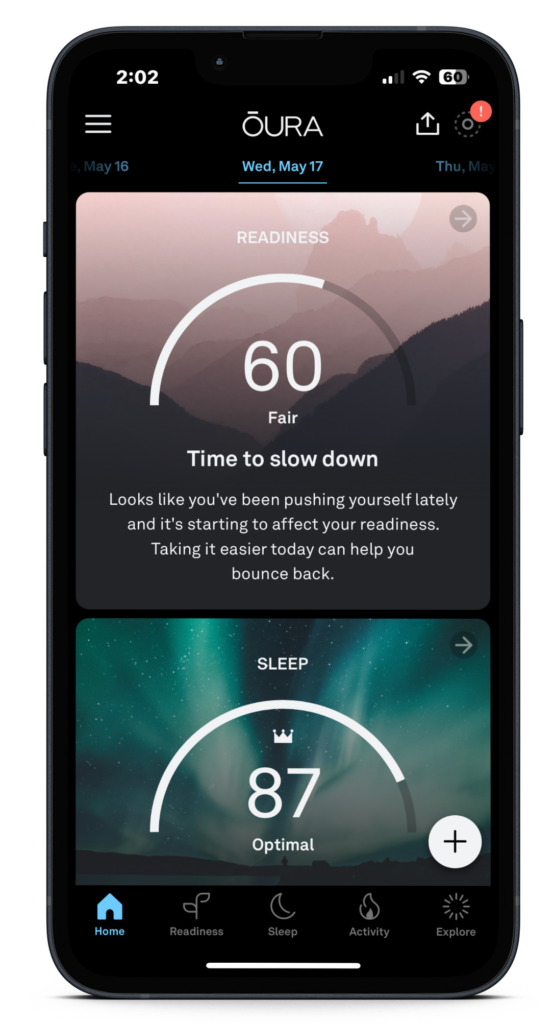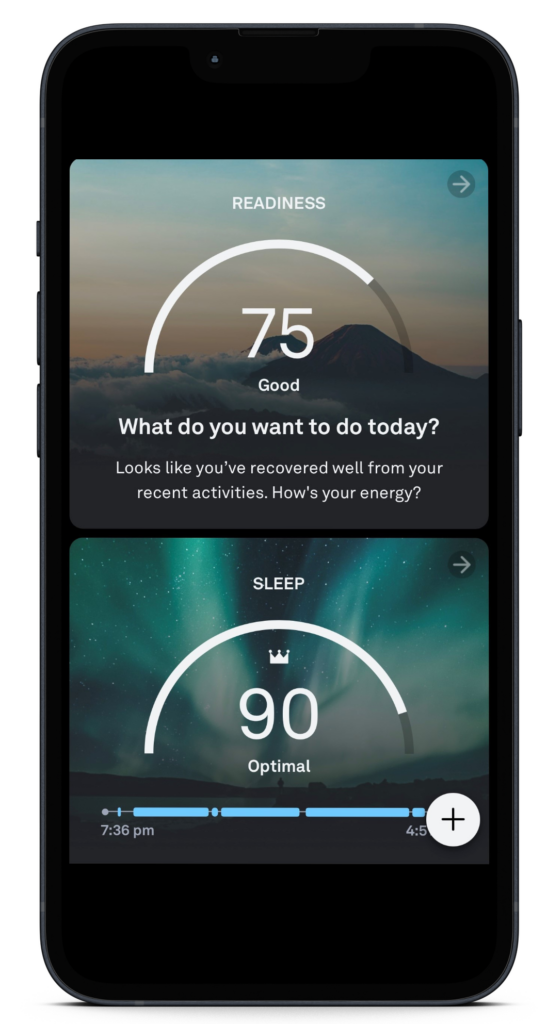Who: Julie D., 56, an endurance triathlete who won the Ironman World Championships in 2022, and Jim H., 91, her father, who retired in 1996 and has spent many years sailing around the Americas. Both live in San Diego.
Surprising Oura insight: After experiencing a consistently elevated resting heart rate (RHR) for more than two weeks, Julie was notified by Oura that certain medications can affect RHR. This alerted her to discover that an elevated RHR is a side effect of a new supplement she had started, prompting her to discontinue use.
Jim noticed a sudden spike in his heart rate, which caused him to pass out while walking. Now, he monitors his heart rate to preempt any possible issues. He also monitors his sleep quality after picking up a new TikTok habit. Fortunately, after some experimentation, he was able to see that TikTok doesn’t impact his sleep, so his nightly routine continues!
Read Julie’s solo interview with Oura to learn more about her background as an Ironman champion.
Tell us about your backgrounds — what led you both to lead such active lifestyles?
Julie: Being active is unquestionably ingrained in my DNA. Before I was a year old, my dad would toss me off the diving board, a literal sink-or-swim experience. Throughout my childhood, I would spend my entire summer days outside, from the pool to playing games, only coming in when the street lights came on. I then swam at college, but my need to move was still strong once I left, which is how I discovered endurance triathlons.
Our family was always on the move, embracing an active lifestyle. We would go biking, hiking, canoeing, and sailing together. Our vacations were never about lounging by the pool; they were filled with adventures and exploration.
Jim: Growing up, I discovered sailing, skiing, and backpacking – whenever I had the chance, I’d spend my time doing one of these hobbies. I was told at a young age that it’s vital to have a regular exercise regimen to stay healthy. That discipline to stay active has persisted throughout my life.
What led you to Oura?
Julie: I purchased an Oura Ring primarily because of its advanced sleep-tracking capabilities, heart rate variability (HRV) monitoring, and recovery analysis. As an endurance triathlete, I aim to push my physical limits constantly. However, balancing intense training and allowing my body sufficient rest has become increasingly difficult as I grow older. With Oura, I wanted to gain valuable insights into my sleep patterns, HRV readings, and recovery status, enabling me to optimize my training regimen and achieve peak performance without overexerting myself.
Jim: Julie encouraged me to get one. I had been using another wearable to track my heart rate and HRV, but I wasn’t sold on the accuracy. I did thorough research before landing on Oura. I use Oura to track my daily activity – I walk two miles every day, swim three to four times a week, and strength train.
[Editor’s note: We are beyond impressed at this activity level — let alone at 91 years old!]
READ MORE: What Is Heart Rate Variability (HRV)?
How do you use Oura to support your daily life and fitness routine?
Jim: I use Oura to check my heart rate – at 91, it’s important for me to be aware of any sudden heart rate changes. Recently, I passed out while walking and went to the ER. My Oura App showed that my heart rate jumped from 76 to 124 bpm. As a result, my doctor implanted a permanent HR monitor in my chest, but I can’t access the readings – so I use Oura to monitor it! I currently have an HRV of 85, which I’ve heard is great for my age.
READ MORE: Member Ted N. Used his Oura Data to Detect an A-fib Episode
Julie: I spend an average of 15 to 20 hours per week training, juggling three swims, four runs, and three bike rides. So it’s really important that I can balance this activity with recovery. Oura helps me do that. Every morning, I open my Oura App and eagerly await the results of my Readiness and Sleep Scores.
READ MORE: How Sleep Helps Muscle Recovery and Growth
When I receive a low Readiness Score for the first day, I don’t make any immediate changes, but I do take note of it. However, if I receive a low Readiness Score for a second consecutive day, I pay closer attention and take action. I review my training regimen for that day and may contact my coach if the score aligns with how I’m feeling.
When Julie notices a low Readiness Score for two days consecutively, she reduces her workout intensity to let her body recover.
We also regularly compare and discuss our Oura scores. During most lunches, we start by sharing our respective scores and exchanging valuable insights we’ve gained from the data provided by Oura. It has become a meaningful and engaging topic of conversation between us.
READ MORE: Introducing Oura Circles: Connect with Your Community and Reach Your Goals Together
What’s the most surprising thing you’ve learned about your health from using Oura?
Jim: Oura showed me that I can sleep quite poorly. I wake up two times a night to use the bathroom, which disturbs my sleep. I have had a long-term habit of reading before bed, but since I joined TikTok, I switched out my nightly reading to watch TikTok videos. I was advised that this might be the cause of my poor sleep, so I tested it out – for one week straight, I read before bed, and the next week I watched TikTok. My sleep was the same – so my TikTok habit is continuing!
RELATED: This Member Ran 2 Sub-3-Hour Marathons in 6 Days: Here’s How He Used Oura To Train
Julie: I learned what causes my Sleep Score to plummet. Without a doubt, consuming alcohol disrupts my sleep patterns, and so does eating too late. When I eat late at night, it takes longer for my resting heart rate (RHR) to drop, which impacts my overall sleep quality and subsequent recovery process.
However, the most important lesson I learned was during a period of 14+ days with consistently low Readiness Scores and elevated RHR, unrelated to overtraining or altitude. Oura sent me a notification suggesting that certain medications could affect heart rate. This triggered the realization that I had recently started taking a new supplement, which could potentially lead to an elevated heart rate. I had been experiencing low-grade headaches, attributing them to my poor sleep, low readiness, and gastrointestinal distress.
Once I discontinued the supplement, I noticed a heart rate reduction that night. My Readiness Score improved, and most notably, my gastrointestinal distress vanished. This incident highlighted the powerful connection between certain medications, heart rate, and overall well-being, further emphasizing the value of using Oura to gain insights into my health.
READ MORE: 9 Science-Backed Herbs and Supplements for Better Sleep
What’s Your Oura Story?
Everyone’s story is unique, and we’d love to hear yours. Share your story here.







